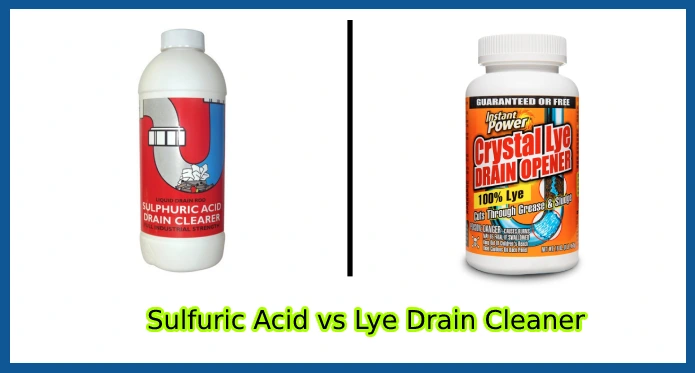Last Updated on August 28, 2023
Are you stuck trying to choose between sulfuric acid and lye drain cleaner when unclogging a particularly stubborn clog? Both can be viable solutions, but there are critical differences in the safety considerations and level of effectiveness.
From the increased metal corrosiveness of sulfuric to the mild lye, the range of pH levels and chemical compositions will help make sure you find a solution that fits.
So if you’ve ever needed help deciding which drain cleaner is suitable for the job without getting up close with its acidic or caustic fumes, here’s your guide on understanding how these solutions differ.
Let’s dive into the differences between these drain cleaners, from their cleaning power to how they affect clogs. We’ll also talk about potential dangers you should know before taking any DIY action.
Sulfuric Acid vs Lye Drain Cleaner: Interesting Differences
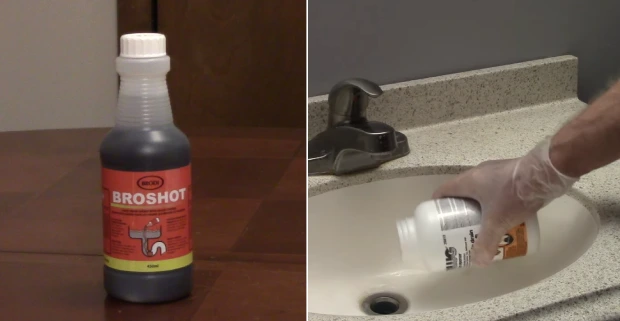
Sulfuric acid (H₂SO₄) and lye drain cleaner are two incredibly powerful substances that are often used in industrial and household applications. These two chemical compounds have very different properties and can produce vastly different results when used to unclog drains.
Chemical Composition
The primary difference between sulfuric acid and lye drain cleaners is their chemical composition. Sulfuric acid is a highly reactive mineral acid composed of hydrogen sulfate (H₂SO₄). This acidic compound can be hazardous if handled improperly, as it can burn skin instantly upon contact.
On the other hand, the lye drain cleaner is commonly made from sodium hydroxide (NaOH), also known as caustic soda. It is an alkaline substance, meaning it has a pH level higher than 7 on the pH scale.
Unlike sulfuric acid, lye drain cleaner does not typically cause instant irritation upon contact with skin but can still be extremely hazardous if mishandled.
Metal Corrosiveness
Another key difference is how lye and sulfuric acid interact with metals such as copper or steel. Sulfuric acid tends to corrode metals quickly due to its strong oxidizing properties, whereas lye drain cleaner usually takes much longer to corrode metal surfaces due to their alkaline nature.
Furthermore, sulfuric acid can cause faster erosion of metal surfaces which may lead to structural damage over time. In contrast, lye drain cleaners take much longer for any noticeable effects on metal surfaces.
Water Contact Reaction
Another significant difference between sulfuric acid and lye (Potassium or Sodium hydroxide) drain cleaners lies in their water contact reaction.
When sulfuric acid comes into contact with water, it creates immense heat, which could cause burns on PVC pipes if not handled carefully. It may also produce toxic gas fumes that are harmful to humans over long exposure periods.
On the other hand, when lye interacts with water, it produces a mildly exothermic reaction resulting in some heating but nothing near the intensity created by sulfuric acid’s reaction with H₂O molecules.
Also, no gasses or toxins are released when the lye drain cleaner reacts with water. This makes it far safer than sulfuric acid when cleaning pool decks and basement drains.
Cleaners pH Levels
Sulfuric acid has a much higher pH level than lye drain cleaners, ranging from 2-3 on the pH scale. This makes it very acidic and capable of quickly dissolving waste, grease, and other debris in drain lines.
This acid also breaks down mineral deposits that can cause drainage problems, making it an excellent option for those who want to keep their metal pipes clean and flowing efficiently.
On the other hand, lye drain cleaner has a much lower pH level of 12 to 14 on the pH scale. This makes it slightly more caustic than sulfuric acid but capable of removing tough clogs in drains.
Material Types
Sulphuric acid is generally sold in liquid form, while lye drain cleaners are usually a powder or granular in structure (sometimes in liquid). The former is quick to dissolve into liquids, while the latter needs some time before being effective in breaking up blockages in drains.
Regarding material types, sulfuric acid can be used for many different materials, such as metals and plastics, while lye is only suitable for certain materials, such as organic materials like hair and grease that clog up pipes.
Cleaner Melting Point
The major difference between lye drain cleaner and sulfuric acid (H₂SO₄) is their melting points. Sulfuric acid has a boiling point of 638.6°F (337°C), while lye has a melting point of 604.4°F (318°C).
This difference in melting points means that sulfuric acid will remain in its liquid form even at higher temperatures, while lye begins to solidify as the temperature rises. As such, sulfuric acid is better suited for cleaning drains that contain heavier materials or when extra pressure or heat is needed to break through clogs.
What Professionals Use to Unclog Drains: Sulfuric Acid or Lye Drain Cleaner?
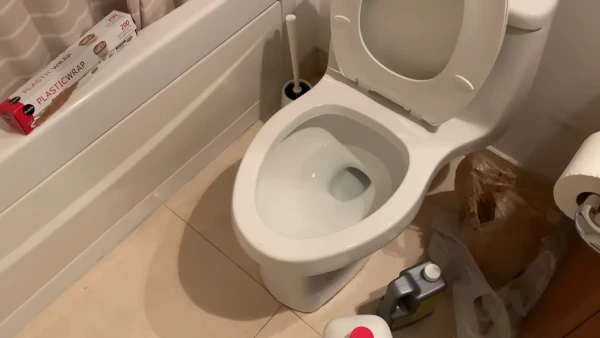
Professionals have various tools and techniques for unclogging drains, but many prefer sulfuric acid or lye drain cleaner as their go-to options. Sulfuric acid is an incredibly powerful and versatile solution that can unclog any stubborn blockages.
It is also easier to use than other chemicals and has a relatively low risk of damaging surfaces. Sulfuric acid can quickly break apart mineral deposits built up in plumbing systems over time, making it an ideal choice for clearing slow-running drains or restoring water flow in clogged pipes. It also works well for removing rust build-ups from galvanized steel pipes.
Lye drain cleaner can be an effective way to tackle clogs caused by grease or soap scum buildup. This caustic alkaline substance dissolves organic matter, such as grease and soap scum buildup. The active ingredient in lye, sodium hydroxide, can break down proteins and fats, allowing it to clear clogs effectively.
Does Sulfuric Acid Clean Heavy Clog Drain Effectively?
Yes, sulfuric acid can effectively clean heavy clogs in drains. This is because sulfuric acid has strong oxidizing properties, meaning it reacts with organic matter and minerals, such as grease, rust, and oil. It breaks down these materials and dissolves them so they can be washed away from the drain.
When appropriately used, sulfuric acid can unclog a drain within an hour or less. But, it is essential to take care when using sulfuric acid as it is highly acidic and can cause irritation to the skin and eyes if mishandled.
What Will Dissolve Hair in a Clog Drain: Lye or Sulfuric Acid Drain Cleaner?
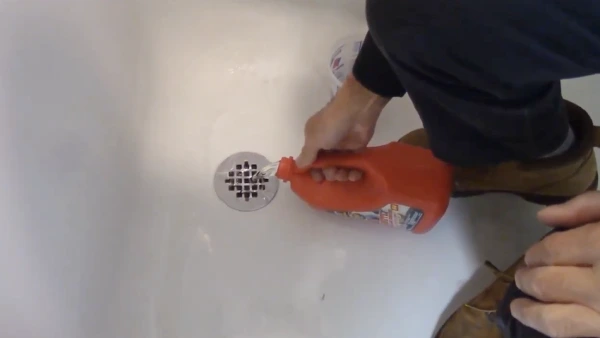
Lye is the most effective option for dissolving hair in a clogged drain. Lye is sodium hydroxide that reacts with fatty acids found in hair follicles. This reaction breaks down the bonds of the fat molecules, which will dissolve the hair inside the clogged pipe.
Sulfuric acid may also dissolve some hairs but does not possess the potency or effectiveness that lye does when dealing with tough clogs caused by hair build-up inside pipes.
Can Sulfuric Acid Drain Cleaner Damage Any Pipes?
Sulfuric acid drain cleaners can damage certain pipes if used improperly or overused. It is not suitable for use on metal pipes (such as stainless steel, aluminum chrome, or galvanized steel) for a long time due to its corrosive nature. This could lead to corrosion and leaking over time.
Plastic pipes may also be damaged by sulfuric acid if left in contact for too long and too concentrated for the specific type of plastic used in the pipe material. Due to this, caution must always be taken when using sulfuric acid drain cleaners on any type of pipe material.
Can You Pour Sulfuric Acid Direct Down the Drain?
Don’t go pouring sulfuric acid directly down the drain. Not only is it insanely dangerous, but this highly corrosive liquid has a wicked reaction to common materials like plastic and metal, leading to extensive pipe damage.
It can also generate by-products that are hazardous if released into the environment, such as hydrogen sulfide gas or heavy metals. If poured down the drain, it can also accumulate in the sewage system, leading to issues in wastewater treatment plants.
Furthermore, sulfuric acid is a strong oxidizer and can spark fires or explosions when mixed with flammable substances like organic matter or oil. So, it is always best to use caution when handling hazardous material like sulfuric acid.
Will a Lye Drain Cleaner Damage PVC Drain Pipes?
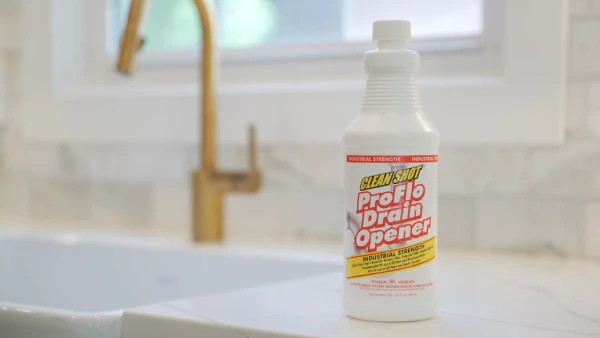
Using a lye or sodium hydroxide-based drain cleaner on PVC pipes may cause some damage over time due to its high alkalinity. Lye corrodes many materials due to its chemical nature and can even react with PVC pipe when left in contact for extended periods.
Also, sodium hydroxide may generate excessive heat upon contact with water, weakening the pipes and making them more prone to breaking in extreme cases. Thus, using lye-based cleaners on PVC plumbing systems is generally not recommended as they may lead to costly repairs if left unchecked.
Can You Mix Lye and Sulfuric Acid Drain Cleaner?
Dabbling with lye liquid drain cleaner and sulfuric acid could spell serious trouble. These volatile compounds can generate intense heat, noxious fumes, and sour water. Don’t let their seemingly innocent appearance fool you. Hydrogen sulfide is hazardous to your health if inhaled or absorbed through skin contact.
These two chemicals should not be mixed as their reaction will produce large amounts of heat, which could cause an explosion in extreme cases.
Do Sulfuric Acid and Lye Drain Cleaners Pose Health Risks?
Yes, sulfuric acid and lye chemical drain cleaners pose serious health risks if used improperly or in an unventilated space. Sulfuric acid is a highly corrosive liquid that produces toxic fumes when heated or mixed with other substances.
Direct contact with skin or membrane surfaces can cause severe burns, tissue damage, and potential organ failure. Inhalation of the fumes produced by sulfuric acid can irritate the eyes, nose, throat, and lungs leading to respiratory issues such as bronchial constriction or pneumonitis.
Beat Stubborn Clogs with Sulfuric Acid and Lye Drain Cleaner
Using sulfuric acid or lye drain cleaner can effectively clear tough clogs, but they must be used with extreme caution due to their strength and corrosive nature.
Before attempting any DIY plumbing project, it is essential to understand the differences between sulfuric acid (H₂SO₄) and lye drain cleaners and the associated risks.
Both have pros and cons regarding chemical composition and metal corrosiveness. Carefully weigh all these considerations before deciding which product suits your needs.
With the proper knowledge and safety protocols in place, these powerful products can be effective in helping you solve your most challenging drain cleaning problems.

